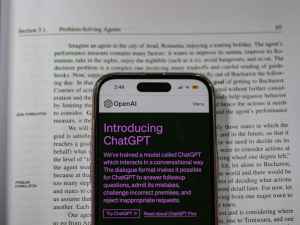The Trash Book Deluge: How AI and Greedy Algorithms Flooded the Ebook Market
Remember those early days of online video streaming? You know, back when you had to dodge flashing banner ads and sketchy “play” buttons that led to…well, who knows where, just to watch your favorite show on some sus website? Yeah, good times. Except, that whole chaotic, user-unfriendly mess is happening right now in the ebook and audiobook market.
And no, this time it’s not about piracy. This is about a whole new breed of digital snake oil salesmen. We’re talking about folks exploiting the heck out of online platforms and the, frankly kinda scary, power of AI. Their game? Churning out low-quality, often completely bonkers books, all while promising readers untold riches, but ultimately leaving them swimming in a sea of digital garbage.
The Rise of the SEO-Stuffed “Bio”
Author and tech journalist Kara Swisher got a major dose of this hot mess firsthand. When her book, Burn Book, hit the virtual shelves, it was like a bizarre literary circus rolled into town. Alongside her actual work, a whole slew of ebooks with titles that could only be described as “interesting” popped up. These weren’t, like, heartfelt homages or anything. Nope, they were straight-up SEO-stuffed “biographies,” hastily glued together using AI and fueled by the blood, sweat, and tears of (probably very tired) ghostwriters. Their sole purpose? To trick unsuspecting readers searching for Swisher’s real deal into clicking on their shady links.
This whole debacle threw a giant, neon spotlight on a much bigger, much grosser problem: a shadowy underground (or maybe not-so-underground) ecosystem churning out countless low-quality ebooks and audiobooks. Driven by the cold, unfeeling logic of algorithms that prioritize keywords and clicks over things like, you know, actual quality, these books are like the literary equivalent of a spam folder come to life. They peddle misinformation, repackage basic info you could find with a five-second Google search, and some even stoop as low as to steal established authors’ names, trying to pass themselves off as brand-spanking-new releases.
How Algorithms Got Us Here
So, how did we get here? How did the once-noble ebook market become overrun by these digital bottom feeders? Well, you can thank (or maybe blame?) the almighty algorithm. See, these digital gatekeepers, in their never-ending quest for clicks and conversions, have inadvertently created the perfect breeding ground for this literary dumpster fire.
Here’s the deal: algorithms love keywords. They’re like the digital equivalent of catnip. So, naturally, anyone trying to game the system is going to stuff their ebook titles, descriptions, and even the content itself with as many relevant keywords as they can cram in. This creates a vicious cycle where books are ranked not by their quality, originality, or even their readability, but by how well they can appease the algorithm gods.
The Perils of Clickbait Titles
And let’s not forget about those oh-so-enticing clickbait titles. You know the ones: “The Shocking Truth About [Insert Random Topic Here]” or “You Won’t Believe What Happens Next! [Spoiler alert: probably nothing that exciting]”. These titles are designed to prey on our curiosity, our FOMO, our deep-seated desire to know things that we probably don’t actually need to know.
But here’s the kicker: once you’ve been lured in by the promise of juicy secrets or mind-blowing revelations, you’re often left feeling like you just wasted [insert precious time unit here] of your life on something that was, at best, underwhelming and, at worst, complete and utter nonsense. And the worst part? The algorithm doesn’t care. It already got its precious click.
The Allure (and Illusion) of Easy Money
So, what’s driving this whole shady operation? What’s fueling this digital gold rush, where the gold is mostly fool’s gold? Well, it’s a toxic cocktail of easy self-publishing platforms, AI-powered tools that are arguably being used for evil, and the ever-alluring siren song of passive income.
Enter the self-proclaimed ebook gurus, stage left. These digital hucksters are more than happy to sell you the “secrets” to ebook riches. For a small fee (or, let’s be real, a pretty hefty one), they’ll teach you how to “hack the system,” “game the algorithm,” and basically turn yourself into a lean, mean, ebook-producing machine.
The Gurus and Their “Get Rich Quick” Schemes
Take the Mikkelsen twins, Christian and Rasmus, who run Publishing.com. These guys are like the poster children for this whole “get rich quick” ebook scheme. Their pitch is simple: leverage AI to spit out outlines and topics faster than you can say “plagiarism,” hire a team of dirt-cheap ghostwriters who are probably just as desperate as you are, game Amazon’s algorithm with more fake reviews than a Hollywood blockbuster, and then sit back, relax, and watch the passive income roll in like a tidal wave of sweet, sweet cash.
Except, there’s a teensy-weensy problem with this whole plan. It’s basically a giant scam, preying on people’s hopes and dreams of achieving financial freedom. Sure, there might be a handful of people out there who’ve managed to make a quick buck using these methods, but for every “success story,” there are countless others who’ve been burned. Badly.
The Hidden Costs of “Easy” Money
What these gurus don’t tell you is that this unethical approach is basically like throwing a grenade into the already fragile ebook ecosystem. It floods the market with garbage, devaluing the work of actual, you know, talented writers who actually care about things like quality and originality. And let’s not forget about the readers, the poor souls who are left to sift through this digital landfill, desperately searching for something, anything, worth reading.
The Real Victims: Readers and Writers
Let’s be real, this whole race-to-the-bottom situation in the ebook world? It’s like a dumpster fire where everyone gets burned except for the grifters fanning the flames. Readers get bombarded with more misleading titles than you can shake a stick at, wading through a sea of fake reviews that make it feel like finding a decent book is about as likely as winning the lottery.
And writers? Don’t even get me started. Especially the ones pouring their heart and soul into their craft, the ones who actually care about telling a good story or sharing something meaningful with the world. These folks are struggling to keep their heads above water, competing against this tidal wave of cheaply produced content that’s about as deep as a kiddie pool.
Platforms: The Enablers?
Now, I’m not saying the platforms themselves are out here twisting their villain mustaches and cackling maniacally. But, let’s just say they’re not exactly innocent bystanders in this whole mess. Their relentless focus on cost-cutting and algorithmic optimization? It’s basically created the perfect storm for this exploitative ecosystem to thrive. Like building a luxury resort right next to a mosquito breeding ground – what did they think was gonna happen?
They’ve got all the power to implement stricter content moderation, to crack down on those fake reviews like it’s going out of style, and to, you know, maybe prioritize quality over quantity for once. But are they doing it? Not nearly enough.
A Call for Change: Because Nobody Likes a Digital Dumpster Fire
Look, this isn’t just about bad books, okay? This is about the erosion of trust and value in the literary world. It’s about the slow, agonizing death of originality and creativity as we know it. Dramatic? Maybe. Accurate? Absolutely.
We need a full-on, multi-pronged attack to combat this digital beast:
- Platforms: Get your act together! Implement stricter content moderation, develop algorithms that can actually recognize quality content, and for the love of all that is good and holy, crack down on those fake reviews already!
- Readers: Channel your inner Sherlock Holmes. Be more discerning, check those reviews like your life depends on it, and support authors directly whenever you can. Every purchase is a vote for the kind of content you want to see more of.
- Writers: Resist the siren song of those “get rich quick” schemes. Focus on crafting quality work that you’re proud of, even if it takes longer or requires more effort. And don’t be afraid to explore alternative publishing avenues!
The Future of Reading: Choose Your Own Adventure
The future of reading shouldn’t be some bleak, dystopian wasteland where we’re all drowning in a sea of meaningless content. We have the power to choose a different path, a path where quality reigns supreme, where readers can trust what they read, and where writers are valued for their craft.
We need to demand better from platforms, support ethical creators, and reclaim the value of authentic storytelling. Otherwise, the trash book deluge will just keep on rising, and honestly, ain’t nobody got time for that.

Let’s not let the ebook market become this.







